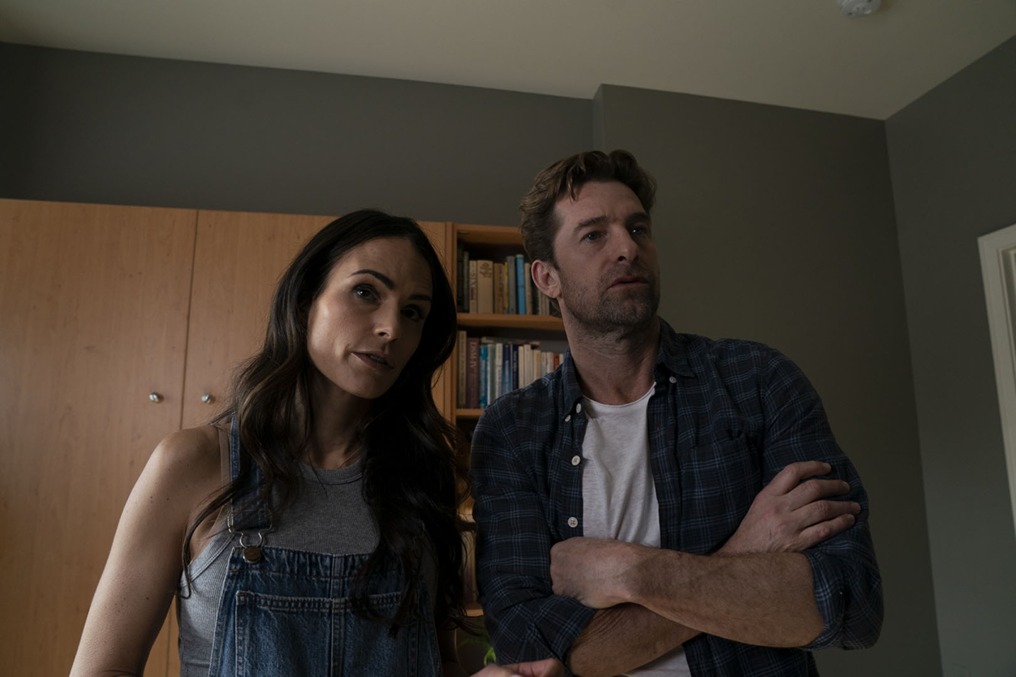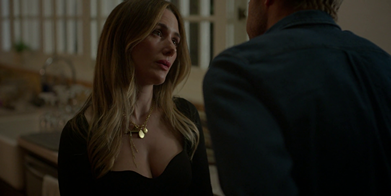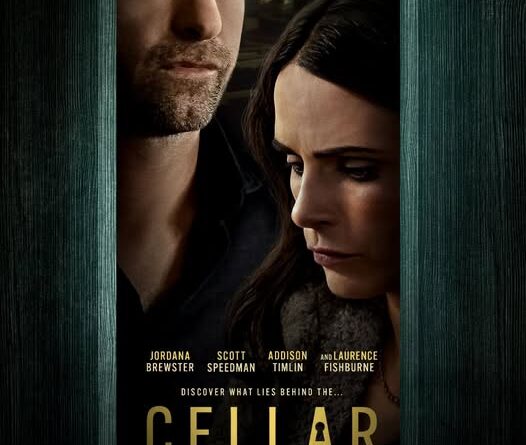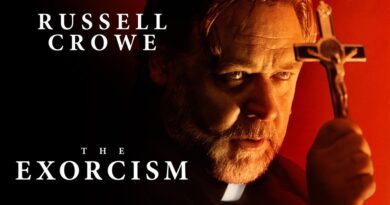“Cellar Door” Keeps It’s Secrets Behind Doors, Sadly | Review
A dilemma happens to me in quite a few movies I watch: trying to decide whether it is possible to call something I have just watched horror. So, in some cases, I decide during the movie whether it can enter the category and thus receive a place of honor on the site. “Cellar Door” presented me with exactly this dilemma. On the one hand, its basic plot story seems as if it came off the assembly line of horror movies, about a young couple (!) who experience trauma (!) and move to live in a new house (!) with a dark secret (!) behind it: a basement door that is simply forbidden to open (!!). Every exclamation point here is not accidental because these are very well-worn horror conventions, which we have seen in a thousand and one other versions.
On the other hand, “Cellar Door” feels much more like a thriller; some would say a drama with various elements of suspense. Although it has a dark secret, a twist we reveal towards the end of the film, and even some violence (yes!), the film doesn’t really have the structure of a horror film in the complete sense of the word; its secret remains too vague, and the feeling is of a somewhat “sleepy” film, which is much more suitable for television (basically, this is a film intended for television and streaming services).
“Cellar Door” is a solid film with so much potential. It is a film with some interesting moments and a cool concept, that does not receive a satisfactory resolution and leaves us slightly disappointed. So why is it still worth giving it a chance?
What Is The Cellar Door Movie About?
The truth is that “Cellar Door” looks like a horror film at some point until you actually watch it. Here is, for example, the trailer for “Cellar Door,” which has the structure of a horror thriller.
If we quickly analyze the trailer, we can see the well-known scenes of a couple moving into a new house and being impressed by it, a well-worn line about houses having secrets, reflexive dialogue about horror films (“Let’s go visit the dude we don’t know with the big, scary house out in the middle of nowhere. What could possibly go wrong?”) and also some conventions of films of this type, such as the sound of footsteps on the floor above, doors creaking slowly, a glimpse of a person walking through the frame but right in front of the camera, lines referring to a commandment that the couple is supposed to break (“Never…”), an investigation into the mysterious past of the house (“25 years ago, Emmett Claymore’s wife and daughter just disappeared”).
Of course, there is also the line standard in films of this type, “There’s something about this house, blah blah blah.”, accompanied by the central dilemma: a character who says, “We have to leave,” while the other character is debating because there is something in this life that attracts him. After all, who among us has the strength to deal with the dirt, the stench, the mice, and the cobwebs that will probably be in a basement locked up for too long?
Maybe our expectations for a horror film par excellence are related to the fact that we are talking about a basement here, which horror magazines have accustomed us to as a scary place full of trouble. Only recently have we seen a few films with exactly this central idea: “The Cellar” from 2022 with Elisha Cuthbert, for example, presented a family who discovers that their daughter disappeared one night in the basement of a house full of strange symbols. A little later, we saw “Baghead,” about a young woman who inherits a pub with what looks like a monstrous woman in its basement. And that’s without mentioning the many thriving scenes in horror films that took place in dark basements, such as “Psycho,” “The Silence of the Lambs,” “The Conjuring” “Barbarian,” “It,” “A Quiet Place,” “Get Out,” “The Amityville Horror” – and the list goes on.
However, this is not exactly a horror film. If the starting point of the “Cellar Door” plot is something like “a couple who have experienced personal trauma move (for free) to live in a mysterious house, with one condition: they are never allowed to open the basement door,” we might expect a horror film to begin with some cryptic scene that perhaps shows what happened in the past in that basement, a scene that probably ends with a shot of a slamming door and a black screen. Or some shitty other formula.

In reality, we meet a couple trying to choose something for their intended baby’s room. Sarah (Jordana Brewster, “Fast & Furious,” “The Texas Chainsaw Massacre,” “The Faculty”) is a mathematician who, throughout the film, utters sentences about mathematics that seem to be a metaphor for life itself or something else. John (Scott Speedman, “The Strangers,” “Underworld,” “Crimes of the Future”) is an architect who has been in a relationship and is currently having an affair with Alyssa, his sexy office colleague (Addison Timlin, “The Town That Dreaded Sundown,” “Odd Thomas,” “Californication”). One day, Sarah plays the piano, then miscarries, and the couple decides they can’t stay in this house, and then the opening credits roll.
Desperate, the couple tries to start a new chapter in a new home but can’t find a suitable property. One day, they run into Emmett (Laurence Fishburne, “The Matrix,” “Event Horizon,” “John Wick”), a very likable guy who even wears a sweater that expresses his warmth or something like that. They chat and drink wine until Emmett offers them to sleep at his house. When they wake up in the morning, they discover that the generous host has left the house but has left them a letter with a contract: The home is them for free (!) as long as they make sure not to open the cellar door. If they open the door, the contract ends immediately. This is when sentences like “The only free cheese is in the mousetrap” or “If the property is too cheap, there’s probably some kind of puke in it. Check with an appraiser, do a home inspection, or go to the city hall right now, man” come up.

Cellar Door: A Horror Movie or Family Melodrama?
The film’s big mystery, at least at its starting point, is, of course, what is in this house, or more precisely, under it. The big problem is that these issues accompany the film throughout but do not necessarily constitute the main plot.
At a certain point, a subplot comes into play, which is plausible but one that belongs in another film and takes up a large part of the screen time. This plot concerns the sexy colleague from the office, who still wants John, probably because he is still sleeping with her. We get a reasonably familiar story about a guy who deals with temptation from the office and also breaks the rules (this is indeed freaking Addison Timlin, but that is no reason to have an affair!), a girl who wants a little more and tries to get revenge on that guy who’s a little hesitant, and then a certain mystery related to that girl.
No spoilers, of course.

The film takes place on several levels at the same time. There’s the story with the dark secret of the house, and especially John’s curiosity to discover what’s in the basement door, in complete opposition to the wishes of his wife, who fears that everything they’ve achieved (for free!) will go down the drain if they break the contract. If you’ve seen horror films about haunted houses or those with a mysterious secret, you’ll recognize most of the elements in this dilemma.
At the same time, there’s a particular mystery related to John, who is afraid that his wife will discover his dark secret, which is reminiscent in a certain way of films from another genre, like “Gone Girl” or “Fatal Attraction.” These two stories run in parallel but don’t precisely connect harmoniously, although there is a twist that is supposed to do so. Ultimately, the film ends with a large part of the questions we asked about the first mystery for about an hour and a half remaining unanswered, and the twist of the second mystery that may surprise some, be apparent to others, and annoy many.
No spoilers, of course.
“Cellar Door” is a reasonable film but devoid of thrills. It has a cool concept and a nice idea, but they haven’t decided what to do with it and in which direction to take the film. The direction by Vaughn Stein (“Terminal,” “Inheritance,” “You Belong to Me”) is reasonable but a bit too routine. The director’s use of location and the means at his disposal to build the atmosphere of mystery, such as lighting, was far from breaking boundaries or raising the level of the film.
The film was rated “R,” but as in many cases in recent years, it is a relatively soft “R.” The film goes too far between the dots in terms of its horror, violence, and sexuality, which are all present but in too measured quantities, certainly from the perspective of horror film fans.
The script by Sam Scott and Lori Evans Taylor (“Bed Rest” with Melissa Barrera, and the new “Final Destination: Bloodlines” film that will be released soon) has some nice points but some misses. The dialogues are lukewarm in some parts, and the script uses too much symbolism to give the viewer credit. For example, the part where the very likable Emmett explains that the couple’s contrasting professions are supposed to reflect some of their behavior or the conflicts that will arise between them, also concerning the question of opening the door. The house and its secrets are metaphors for people’s secrets, so you inevitably need to open the door to learning something. Hence, the secret that we expect to be at the center of the plot becomes almost like a “McGuffin,” a part of the plot that advances it and motivates the characters but is less relevant to the story.
damn, even when the sexy mistress talks about the cellar door and says a sentence like, “I think you wanna look. I think you can’t help yourself”, we understand that she is talking about herself, or should we say her body.

A Metaphor For Something, But Not The Right Thing
The film raises some interesting ideas about human curiosity, repression, and our desire to avoid anything that might jeopardize our optimistic present, but it lacks depth or emotion. The director’s use of the film’s minimal location is interesting because it presents the gap between the positive ideal (the top floor with the children’s room, around the couple’s desire to have a child) and the adverse mysteries, repressions, and secrets (the cellar under the house). The problem is that in terms of atmosphere and sound, most of the film takes place on the main floor – representing reality – and the forays into the other parts are casual. Of course, you won’t find here a brilliant use of the location like Alfred Hitchcock did in “Psycho,” for example, where the different parts of the isolated motel express, according to the famous psychoanalytic analysis, the three parts of the soul according to Freud: the ego, the superego, and the id.
Instead, “Cellar Door” seems to be more of a critique of modern life in the United States, if you can call it that. On the surface, the couple embodies the American dream: young, beautiful, in love, with respectable careers. The problem is that underneath the surface, the situation is far from perfect because they cannot start a family, the wife is not fulfilling herself, and the husband is grazing in foreign fields and forced to deal with the consequences in his personal life and work.
Emmett wonders why they choose to live in the suburbs and not in the big city, the couple explains, but we understand that this choice also comes with a price: you won’t find a masterpiece of horror about suburban life in the style of Stephen King, but you will find some thoughts on loneliness and paranoia. The film shows that it is impossible to have complete freedom, even in the optimal situation where we receive our most significant asset for free.
Oh, I almost forgot: As has been the tradition in recent years, there is extensive reference to the Me-Too issue here, with the familiar story of the man versus woman version, the existing boundary between an affair and sexual harassment, and so on. However, this topic appears in many cultural texts, and the film doesn’t provide many new insights on the subject, so we’ll settle for that for now.

The Cast Of Cellar Door: Decent, With A Few Misses
The actors generally did a good job, even if one could have expected slightly more challenging roles for some of them (Laurence Fishburne, for example, is completely wasted here because his presence is undoubtedly imposing in the few minutes of screen time he has).
There is sufficient chemistry between the couple, although Sarah’s character is almost undeveloped outside of the prism of pregnancy and the desire to bring a child into the world. We mainly get monologues of her talking to an audience (students, apparently) about math and a few segments in which she plays the piano in an empty room, and that’s basically it.
John’s character is much more developed and interesting because we see a representation of him that goes beyond “someone who wants to have a baby.” You can feel the sexual tension between him and Alyssa, another character with the potential to be much more developed.
Should You Watch Cellar Door?
The bottom line is that no matter which category we put “Cellar Door” in, it’s an average film with an interesting idea that got a little lost because it didn’t decide which direction it was going, what emotional process we were supposed to go through along the way, and what messages we were supposed to receive.
As a mystery thriller, with elements that look on paper as if they came out of a movie about ghosts and haunted houses, we hardly get a proper reward for our time – Partly because the solution we get is very, very partial, even regarding the main question (For instance, I guess, what was in the cellar in the movie “Cellar Door”).
. The second part, a romantic suspense drama with a detective mystery, is more impressive and developed. As mentioned, the connection between the two parts is far from perfect – also because the solution we offer is not the most convincing.
We get a film that is slow, routine, and too messy, as if careful not to be extreme. On the positive side, the film is based on an interesting idea and should sometimes be enjoyable. This film is mainly suitable for moments when you want to see something without committing to it.
💀 Killer Deals & Scary Recommendations 💀
🎭 Costumes & Accessories
HalloweenCostumes Fun Costumes Entertainment Earth
🛒 Online Shopping
AliExpress Amazon Walmart Etsy
🧛 Collectibles & Horror Brands
Funko Hot Topic Lego Spirit Halloween
🎢 Attractions & Tours
GetYourGuide Tiqets Viator Klook
📖 Blogs & Horror Sites
Bloody Disgusting iHorror Fangoria
🩸 Disclaimer: Some links are affiliate links. The price stays the same – it just helps keep the site alive 👻





